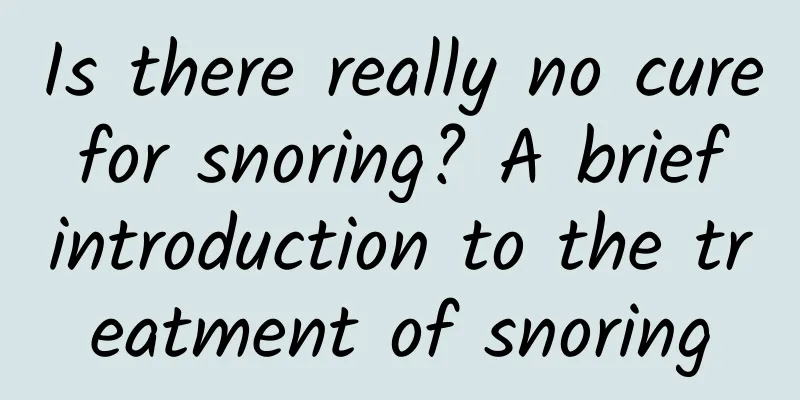Is there really no cure for snoring? A brief introduction to the treatment of snoring

|
Snoring, this seemingly common thing, often gives people a headache. In the dead of night, your partner's snoring is like thunder. Do you often toss and turn because of it? Therefore, most young and middle-aged snoring patients in clinical practice only come to see a doctor at the repeated request of their family members. When many friends come to the snoring clinic for the first time, they often ask: "Doctor, is there any medicine for this disease?" The doctor would also answer awkwardly: "I really don't have that!" Why is it said that there is basically no medicine to cure snoring? This has to start with the cause of snoring. Of course, not all snoring is a disease. What is referred to here is actually a pathological snoring, formally known as obstructive sleep apnea hypopnea syndrome, or snoring for short. The main feature is the occurrence of obstructive apnea, that is, holding your breath. There are many reasons for snoring, but basically they all involve the factor of upper airway obstruction from the nasal cavity to the trachea. Obese friends have fat accumulation in their necks, and the root of the tongue falls back when lying on their backs, which can easily compress the airway; patients with rhinitis and sinusitis have edema of the nasal mucosa, or nasal polyps, which lead to poor ventilation; friends with chronic tonsillitis may have enlarged tonsils, leading to pharyngeal stenosis, etc. These are all common causes of snoring. Of course, there are also some lifestyle habits, such as long-term smoking, drinking, and overwork, which may also make things worse and promote the occurrence of snoring. Is there any medical treatment for snoring ? For the above reasons, there is basically no specific medicine to directly treat snoring. Of course, targeted etiological treatment is also possible according to the different conditions of different patients. For example, after drug treatment, patients with rhinitis have unobstructed nasal cavity, and snoring may be relieved; patients with recurrent chronic tonsillitis, if they get better after drug treatment, and the edema of tonsils and surrounding tissues improves slightly, there may also be a certain effect. However, most snoring patients have upper respiratory tract obstruction in the oropharynx, so there is really no medicine for snoring caused by factors such as narrow pharyngeal cavity, enlarged tonsils, and obesity. So how should snoring be treated? There are actually many treatments for snoring. In addition to the above-mentioned drug treatments targeting the causes, there are also lifestyle changes, surgical treatments, CPAP ventilator treatments, etc. 1. Lifestyle changes If the snoring is mild to moderate and is caused by obesity, by changing your lifestyle and increasing exercise appropriately, the fat in your neck will no longer accumulate after losing weight, and your upper respiratory tract will naturally become more spacious, and the symptoms of breath holding during sleep will also improve. Change your sleeping position at night and try to stay on your side. When you sleep on your side, the root of your tongue is not easy to fall back, and it can keep your respiratory tract open better than lying on your back. In addition, friends who smoke and drink a lot should quit smoking and limit their drinking, and snoring will naturally decrease. 2. Surgical treatment Surgery is also one of the methods to treat snoring, but its effect varies from person to person. For those patients who snore due to anatomical abnormalities such as enlarged tonsils and deviated nasal septum, surgical treatment is very effective and is a good choice. Clinically, snoring surgery with obstruction plane in the pharynx often uses palatopharyngoplasty. The scope of this surgery includes bilateral tonsils, part of the palatine arch mucosa, and part of the uvula. If the oropharynx is compared to a stage full of debris, this operation is like cleaning up the excess part of the stage, then pulling up the curtain and tying it up, so that the space of the oropharynx can be expanded to a certain extent. Of course, some patients who are born with a narrow pharyngeal cavity, or friends with a small mandible, may not have a good effect after this operation. Because such patients have less tissue that can be removed in the oropharynx, a small theater will not become a big stage after cleaning it up. 3. CPAP therapy For those who have severe snoring or cannot undergo surgery for various reasons, CPAP is generally used for treatment. The so-called CPAP is called Continuous Positive Airway Pressure. In view of the upper airway obstruction of snoring patients during sleep, the ventilator will continuously give them a positive pressure to help push air into the airway. The user needs to wear a nasal mask when sleeping. The mask is connected to the host placed at the head of the bed through a ventilation hose. The host will automatically match a suitable pressure to help the patient breathe normally. Of course, it takes a certain amount of time to adapt to the use of CPAP. Many friends may feel a little uncomfortable wearing a mask to sleep at the beginning. Moreover, after using the ventilator for a period of time, it is also necessary to make appropriate pressure adjustments based on the patient's feelings after use or the actual daily usage data recorded by the host chip. It can be seen that the ventilator is not something that can be ignored after buying it casually, and it also needs constant follow-up and debugging. However, as long as you stick to it, the CPAP can significantly improve the patient's breath holding and hypoxia, improve sleep quality, and let you say goodbye to snoring! Therefore, snoring is not without a cure. The medicine here is not the traditional medicine, but a comprehensive treatment plan customized for different patients. I hope each of us can stay away from the trouble of snoring and enjoy high-quality sleep. |
>>: Will drinking tea frequently cause kidney stones? The truth is...
Recommend
Blood test pregnancy program
We all know that each of us comes into this world...
It is not normal if your period exceeds a few days.
Delayed menstruation is a relatively common condi...
Why does a woman's lower body have a strange smell?
We all know that if a woman has an odor from her ...
Does it hurt to restore virginity? These are the knowledge women need to know
Today's society is very open, and few people ...
Can I do B-ultrasound when I have my period?
Girls should avoid their menstrual period when un...
What is the cause of yellow-green and odorless vaginal discharge?
Many female friends know that leucorrhea is an im...
How many days after artificial insemination can implant?
Nowadays, many couples are unable to have childre...
Will teeth cleaning make the gaps between teeth wider and cause air to leak when speaking?
With the improvement of people's living stand...
Menstrual cycle of 40 days is not easy to age
A menstrual cycle of 40 days can easily cause agi...
Why is it easy to get pregnant after angiography?
Hysterosalpingography is mainly used to detect th...
What are the treatments for tibia fractures? When is minimally invasive surgery appropriate?
Author: Wang Qiwei, attending physician at Peking...
Diarrhea at 38 weeks of pregnancy
In fact, the bodies of pregnant women are very se...
How to treat gynecological inflammation in virgins
Any woman is at risk of gynecological diseases, a...
Women's anus swelling always has the urge to defecate
The feeling of anal prolapse is also more common ...
How to tell if raw eggs are bad? 4 ways to preserve eggs in summer
We need to eat eggs almost every day, but in the ...









